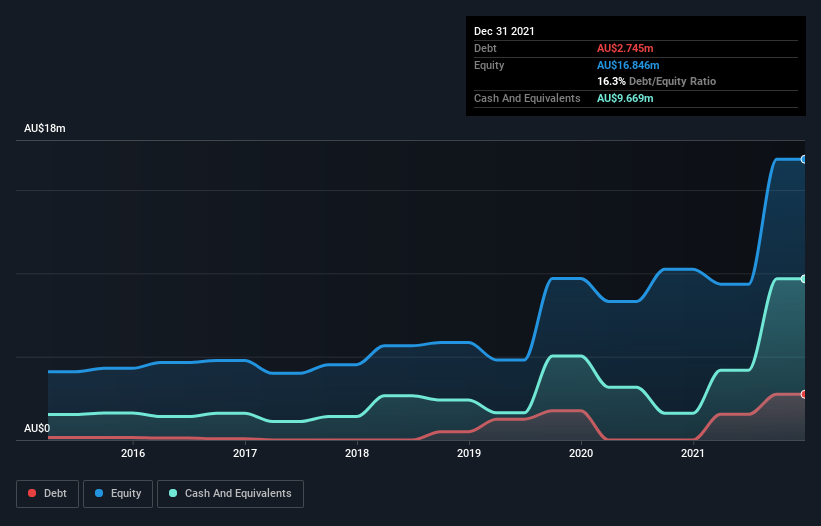Howard Marks put it nicely when he said that, rather than worrying about share price volatility, 'The possibility of permanent loss is the risk I worry about... and every practical investor I know worries about.' When we think about how risky a company is, we always like to look at its use of debt, since debt overload can lead to ruin. As with many other companies Spacetalk Limited (ASX:SPA) makes use of debt. But is this debt a concern to shareholders?
What Risk Does Debt Bring?
Debt assists a business until the business has trouble paying it off, either with new capital or with free cash flow. Ultimately, if the company can't fulfill its legal obligations to repay debt, shareholders could walk away with nothing. However, a more frequent (but still costly) occurrence is where a company must issue shares at bargain-basement prices, permanently diluting shareholders, just to shore up its balance sheet. By replacing dilution, though, debt can be an extremely good tool for businesses that need capital to invest in growth at high rates of return. When we think about a company's use of debt, we first look at cash and debt together.
See our latest analysis for Spacetalk
How Much Debt Does Spacetalk Carry?
You can click the graphic below for the historical numbers, but it shows that as of December 2021 Spacetalk had AU$2.74m of debt, an increase on none, over one year. However, it does have AU$9.67m in cash offsetting this, leading to net cash of AU$6.92m.

How Strong Is Spacetalk's Balance Sheet?
The latest balance sheet data shows that Spacetalk had liabilities of AU$4.08m due within a year, and liabilities of AU$4.62m falling due after that. On the other hand, it had cash of AU$9.67m and AU$3.00m worth of receivables due within a year. So it actually has AU$3.97m more liquid assets than total liabilities.
This short term liquidity is a sign that Spacetalk could probably pay off its debt with ease, as its balance sheet is far from stretched. Succinctly put, Spacetalk boasts net cash, so it's fair to say it does not have a heavy debt load! There's no doubt that we learn most about debt from the balance sheet. But it is Spacetalk's earnings that will influence how the balance sheet holds up in the future. So if you're keen to discover more about its earnings, it might be worth checking out this graph of its long term earnings trend.
Over 12 months, Spacetalk reported revenue of AU$19m, which is a gain of 73%, although it did not report any earnings before interest and tax. With any luck the company will be able to grow its way to profitability.
So How Risky Is Spacetalk?
By their very nature companies that are losing money are more risky than those with a long history of profitability. And the fact is that over the last twelve months Spacetalk lost money at the earnings before interest and tax (EBIT) line. Indeed, in that time it burnt through AU$5.7m of cash and made a loss of AU$3.1m. However, it has net cash of AU$6.92m, so it has a bit of time before it will need more capital. With very solid revenue growth in the last year, Spacetalk may be on a path to profitability. By investing before those profits, shareholders take on more risk in the hope of bigger rewards. The balance sheet is clearly the area to focus on when you are analysing debt. But ultimately, every company can contain risks that exist outside of the balance sheet. To that end, you should learn about the 4 warning signs we've spotted with Spacetalk (including 1 which is concerning) .
Of course, if you're the type of investor who prefers buying stocks without the burden of debt, then don't hesitate to discover our exclusive list of net cash growth stocks, today.
New: Manage All Your Stock Portfolios in One Place
We've created the ultimate portfolio companion for stock investors, and it's free.
• Connect an unlimited number of Portfolios and see your total in one currency
• Be alerted to new Warning Signs or Risks via email or mobile
• Track the Fair Value of your stocks
Have feedback on this article? Concerned about the content? Get in touch with us directly. Alternatively, email editorial-team (at) simplywallst.com.
This article by Simply Wall St is general in nature. We provide commentary based on historical data and analyst forecasts only using an unbiased methodology and our articles are not intended to be financial advice. It does not constitute a recommendation to buy or sell any stock, and does not take account of your objectives, or your financial situation. We aim to bring you long-term focused analysis driven by fundamental data. Note that our analysis may not factor in the latest price-sensitive company announcements or qualitative material. Simply Wall St has no position in any stocks mentioned.
About ASX:SPA
Spacetalk
A technology company, provides wearables, mobile devices, software, and services in Australia, the United States, New Zealand, and the United Kingdom.
Moderate risk and slightly overvalued.
Market Insights
Community Narratives


Recently Updated Narratives


MINISO's fair value is projected at 26.69 with an anticipated PE ratio shift of 20x


The Quiet Giant That Became AI’s Power Grid


Nova Ljubljanska Banka d.d will expect a 11.2% revenue boost driving future growth
Popular Narratives


The company that turned a verb into a global necessity and basically runs the modern internet, digital ads, smartphones, maps, and AI.


MicroVision will explode future revenue by 380.37% with a vision towards success



